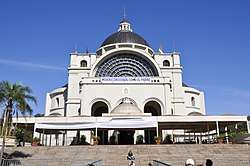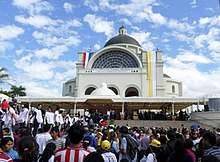Cathedral Basilica of Our Lady of Miracles, Caacupé
| Cathedral Basilica of Our Lady of Miracles | |
|---|---|
 | |
| 25°23′10″S 57°08′37″W / 25.3861°S 57.1435°WCoordinates: 25°23′10″S 57°08′37″W / 25.3861°S 57.1435°W | |
| Location | Caacupé |
| Country |
|
| Denomination | Roman Catholic Church |
The Cathedral Basilica of Our Lady of Miracles[1] (Spanish: Catedral Basílica Nuestra Señora de los Milagros) Also Caacupé Cathedral It is a religious building that functions as the Catholic Cathedral of the city of Caacupé, a city in the South American country of Paraguay.
It is the seat of the Diocese of Caacupé (Dioecesis Caacupensis) that was created as a territorial prelature in 1960 and was promoted to its current status in 1967 through the bull "Rerum catholicarum" of Pope Paul VI.
The Sanctuary of the Virgin of Caacupé is a Catholic basilica in Paraguay that was inaugurated on December 8, 1765 and became a place of pilgrimage for many local believers. The name Caacupé derives from the word Guarani «ka'a Kupe», which means "behind the forest". Caacupé is considered the spiritual capital of Paraguay because it houses the largest sanctuary in the country.[2]
The temple, in addition to its status as a cathedral, is considered by the Catholic national sanctuary[3] and minor basilica .[4] It is under the pastoral responsibility of Bishop Ricardo Jorge Valenzuela Ríos. The church has been visited by two different popes John Paul II in May 1988 and Pope Francis in July 2015.
See also

References
- ↑ Catedral Basílica Nuestra Señora de los Milagros
- ↑ "Caacupé: el santuario, la leyenda y la imagen de la patrona de Paraguay". Catholic.net (in Spanish). Retrieved 2017-08-18.
- ↑ "Misa en el Santuario - Basílica de Nuestra Señora de Caacupé". Retrieved 2017-08-18.
- ↑ Brunn, Stanley D. (2015-02-03). The Changing World Religion Map: Sacred Places, Identities, Practices and Politics. Springer. ISBN 9789401793766.